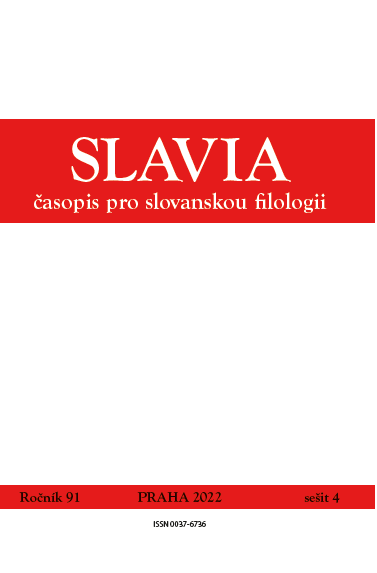О скуке в русском языковом сознании
On skuka ‘boredom’ in the Russian Language Consciousness
Author(s): Andrey Evgenyevich BochkarevSubject(s): Computational linguistics, Eastern Slavic Languages
Published by: AV ČR - Akademie věd České republiky - Slovanský ústav and Euroslavica
Keywords: Russian language; feelings and emotions; corpus studies; language-specific words; propositional model; conceptual metaphor; opinion; evaluation;
Summary/Abstract: The article explores the ways of displaying skuka ‘boredom’ in the Russian language consciousness. The Russian National Corpus is more appropriate for this purpose, because a conceptual configuration of an analyzed concept is not present in a “finished” form in any single utterance, but may be reconstructed only on the totality of all possible utterances. It can be manifested in many different ways: distribution, ability to accumulate some Russian “key ideas”, predisposition to be associated with some emotional attitudes, concepts, propositional and metaphorical models. According to available data, skuka ‘boredom’ may be common, daily, domestic, rural, provincial, metaphysical or wanton by statement; infinite, interminable, bottomless or cosmic in coverage; big, never-ending or eternal by intensity; apparent or thinly-veiled by external manifestation; monotonous, lazy, anguishing, dreary, chilly, sad, alarming, oppressive, hopeless, terrible, savage, crazy, mortal, infernal or cozy by emotional distress; sweet, pleasant, viscous, sticky, nauseating, overwhelming, piercing, cold, dull, unbearable, intolerable, heavy, painful, deadening or full by physical sensations; humiliating, dirty, arrogant or evil by the criterion of moral evaluation; frank, ostentatious, deliberate, affected by authenticity; grey, green, yellow, blue or black in colour. As an emotional or psychological state experienced when an individual is not interested in his or her surroundings, skuka ‘boredom’ is related, in its most manifestations, to many different concepts like provincial life, idleness, monotony, sloth, solitude, stupidity, sadness, gloom, etc. that refer to some typical boredom-situations in which they occur. Those collocations can be explained by many factors: a need to identify the subject of boredom, a need to characterize the indicated emotional or psychological state in relation to concomitant feelings and emotions, a need to represent skuka ‘boredom’ in terms of other conceptual areas as a moral ailment, illness, beast, swamp, abyss, stream or web.
Journal: Slavia - časopis pro slovanskou filologii
- Issue Year: XCI/2022
- Issue No: 4
- Page Range: 456-466
- Page Count: 11
- Language: Russian
- Content File-PDF

